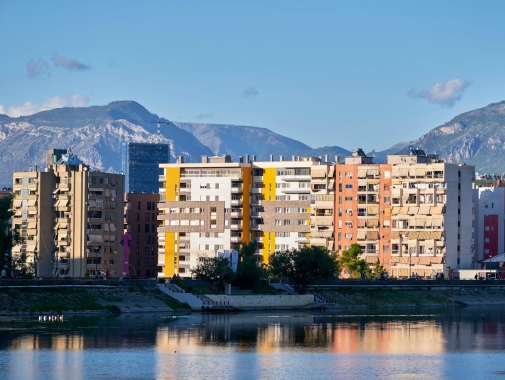Albania’s urban growth: the need for a strategic housing policy
New UNECE analysis with the expertise of Housing Europe recommends policy reforms and new measures
Albania, 21 August 2024 | Published in Housing Systems in Transition
A new analysis by the UNECE (United Nations Economic Commission for Europe), with the contribution of Housing Europe, shows that Albania urgently needs to give "greater political visibility to prioritise housing policy as a central component in making cities and communities sustainable and liveable."
The report also recommends that local governments enhance their capacity and expertise in managing the housing development cycle, including the standards for construction, procurement, and supervision, as well as managing different sources of financing (loans, the national budget, and municipal budgets).
Albania is one of the fastest urbanising countries in Europe, grappling with a set of unique challenges. The pattern of geographical development has led to specific issues, including a lack of affordable housing in high-growth areas and widespread deprivation in declining areas. At the same time, the analysis also highlights that Albania has recently implemented a comprehensive reform package in the housing, planning, regional development, and land management sectors to align with internationally recognised standards.
The country has also faced new challenges in recent years. The earthquake in November 2019 had a significant impact on the country’s financial resources, with over 200,000 people affected by the disaster directly or indirectly, necessitating the reconstruction of over 11,000 housing units. The COVID-19 pandemic further complicated the situation, leading to a GDP loss of 3.3% in 2020. Nevertheless, the economy bounced back in 2021 and 2022, with GDP growth of 8.9% and 4.8%, respectively.
Following mass privatisation and informal constructions in the 1990s, the housing sector in Albania has been dominated by private homeownership, with many new self-build homes and other buildings originally constructed illegally and in squatter areas. The social rental housing sector (whether public, private or mixed) represents only about 0.1% of total inhabited dwellings and cannot compete with the private market.
Our Research Director, Alice Pittini, maps the legal and institutional framework of the housing sector, including housing affordability policies (Chapter II), while Edit Lakatos, a Senior Policy Officer at Housing Europe, explores the housing financing system (Chapter V), looking at state funding for housing, municipal finance, the business model of the National Housing Agency, and ways to finance social housing.
Key recommendations include:
- The introduction of a well-functioning system of housing allowances, with the active involvement of the central government, will be critical for the long-term viability of social rental housing as it could alleviate short-term problems with rent payment that families may have and continue to ensure cost recovery;
- Municipalities need to maintain the good quality of social rental housing and its social mix, avoiding segregation;
- A strong non-profit institution should partner with municipalities and take on the role of a social housing provider;
- There is a need for increased capacity and an enhanced institutional framework at the local level;
- In addition, Albania needs to develop massive social rental housing development programmes with the help of international financial institutions (EIB, CEB);
- Moreover, the mobilisation of private housing can occur through the Social Rental Agency model.